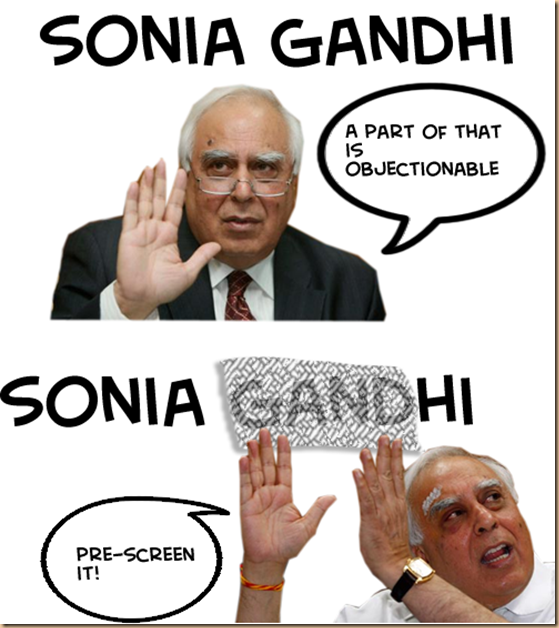It seems like ages ago when a friend of my recommended that I read Arnab Ray’s May I Hebb Your Attention Pliss? Actually, it was less than a year ago that I picked up the book and guffawed my way through it. A lot of water must have passed under the bridge since then, and Mr Ray has accomplished more than published a book in the meantime — he has gone on to write several newspaper columns in several newspapers. So what’s the point of this piece? It is about the disappointment of a fan stemmed from the disappointment of someone he looks up to.
In a recent post, Ray, who goes by the Twitter handle @greatbong, and indeed became famous as the blogger GreatBong, junks the film Rockstar in no uncertain terms, going on to mention that the film offers nothing new.
<Spoiler alert. I am going to discuss certain aspects of Rockstar in quite a detailed manner, and if you still intend to see the film, I recommend that you go and do that, instead of just looking for reviews or discussions on it.>
At the outset, I must say that GreatBong is quite right in at least some of his observations. Nargis Fakhri has as many expressions as a wooden centre table, and may have just been chosen due to any of the dubious reasons whose rumours inhabit the by-lanes of the film industry. His views on parts of the story too can be stomached well, albeit with a pinch of salt at times.
However, I am disappointed in his interpretation of one the climax of the film. Just dismissing it as having been a repeat of the climaxes of some of the films in the 1980s and ’90s is, like he did, is, to me a cardinal sin!
For anyone who has seen the film, the scene in between Nadaan Parindey — where Heer drapes a white sheet over herself and Janardhan / Jordan, and after saying throughout the whole film that she can’t be his, finally decides to declare that she is his, and the calm under the sheet, as she rests her head on his shoulder, is their own world, is of utmost importance!
It is in this scene that, after more than two hours (of film time) of running away from Jordan does she finally become Jordan’s. It is also the moment they consummate their love — two as one. This, ironically is also the moment that leads to he getting her pregnant, which leads to her coma. The greatest irony of it all is that the moment she finally decided to become his was also the moment he lost her forever!
This is just one of the instances that GreatBong has decided to gloss over when reviewing the film. He seems to be stuck perennially with a pair of goggles peering into the 1980s and ’90s. Why, only he knows. I can only speculate that he may have just decided to pander to his target audience who always applaud anything that junks the present era and hark back to the ‘good old days’. A good insight into these people’s psyche might just reveal that they have taken Ray’s satire in May I Hebb… a bit too seriously. On the other hand, I sincerely hope that the GreatBong has written the review in total jest, and I am taking him too seriously.
Meanwhile, here’s a bit more about why I think Rockstar had a certain amount of depth that many other films of recent times didn’t. Let’s start with the anti-Christ feeling of rock, which many think has led to the use of the hand signal known best as the Devil’s Horns to be displayed for rock ballads loved by their listeners. It’s why rock was, and at times now still is, considered evil.
Now connect this with the song Hawa Hawa from Rockstar. Can’t find a connection? Try this. The story the song’s lyrics describes is inspired from the Czech legend of one ‘Sleepy John’. The folktale goes that the queen of the land somehow managed to wear out 12 shoes every night, much to the king’s chagrin.
One day, perplexed to near insanity, the king enlisted the help of Sleepy John who, using his magic powers, found out that every night the land parted for the queen, who would go to meet the Devil himself in his abode underground. There, they would dance all night, and that’s how the queen wore out all 12 pairs of shoes. The phrases like ‘naach rangeeley, sab zehreeley’ make more sense now?
Now compare this with what happens on the screen when the song is playing. Heer, who has been suffering from psychiatric problems, suddenly metamorphoses into the chirpy college girl she once was. Her doctor says that her condition is improving. And that happens when she is in close proximity with Jordan– the bad boy, the devil, the rocker. After all, it is the temptation to be with him that destroys her marriage, her peace, and in the end, her life!
Next, think back to how music always is the leitmotif of Jordan’s life. The GreatBong here refers to dialogues by Kader Khan to sum up what Jordan’s college canteen’s manager tells him, but the philosophy or the thought may have had an even more apt twin in a much older film. Anyone thinking Baiju Bawra by now? True, that nobody told him that he could out-sing Tansen after sustaining a broken heart, but that’s exactly what he managed to do, didn’t he? So are we to say that Rockstar ‘copied’ from this iconic film too? Besides, how many films have used cut shots the way Imtiaz Ali has done in the film to underline the role music plays in Jordan’s life?
If and when that cud becomes too flavourless to ruminate on, try this for a change. The song Nadaan Parindey is inspired by a poem by Rumi, and apparently thought of when became a part of the film’s album when AR Rahman had asked Imtiaz Ali ‘when will the bird come home?’ This is bird of ambition, of aspiration, and maybe of life itself.
It is probably why the lyrics as it to ‘chun chun khaiyo maas. Khayio na to naina more, khaiyo na ko naina mohe, piya ke milan ki hai aas’. He wants the physical pain inflicted on him, in order to forget the pain in his heart, but he just wants his eyes spared, so that he can have a last glimpse — real or in his mind’s eye — of his loved one.
And while we have still not deviated too far from inspirations, I wonder why the GreatBong does nto mention two of the biggest tributes in the film, both of which involve Shammi Kapoor. The first is a small sequence that apparently takes place in Kashmir, with the song Tareef Karoon Kya Uski playing in the background, as Ranbir Kapoor imitates his granddad on one shikara while Nargis Fakhri tries to pout her way into imitating Sharmila Tagore.
The second is Shammi Kapoor’s role in the film, which is clearly inspired by the real-life legend Ustad Bismillah Khan. What is especially poignant is that one of Khan’s grandchildren had been trying to get a biographical documentary on him released, but it saw the light of the day only when AR Rahman himself intervened.
But that’s enough about the film. Let’s get back to GreatBong’s review of the film, and his writings themselves. There was a point of time when I asked him how he manages to write the way he does — yes, I loved, and still love, the way he writes most of his posts. And I would like nothing better than for him to continue doing so. However, I would hate it if he junked really good works of art while pandering to his love for a specific genre of films.
So, Arnab da (Aside: I hope he lets me use the Bengali contraction for an elder brother when I refer to him), here’s looking forward to a lot more articles, blog posts and insights from you, and expecting that the wit and sarcasm in each one is more biting than the previous one. Please don’t let the genre get to you. From a fan, now, and hopefully for a long time to come…


